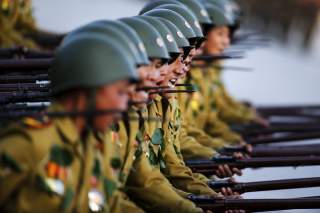Recharging the Trump-Kim Dialogue: The Challenge of Excessive Expectations
Washington should focus on preventing war rather than starting one.
In the space of a year North Korea has gone from perpetual provocateur to responsible player. After sparking concerns in America of conflict and even nuclear war, the North has essentially disappeared from Americans’ consciousness. That could be a convenient tactic but, along with the other changes, suggests a more fundamental reorientation.
Kim might imagine his nation as a responsible, mainstream international player. The model could be India, Israel, or Pakistan. (There are reasons to wish the latter, in particular, did not possess nukes—regime instability and radical influences—but most nations other than India don’t imagine Islamabad launching nuclear-tipped missiles at them.) These countries are normal participants in the international system, despite possessing nuclear weapons.
This apparent new direction gives Washington a different sort of leverage. Possible carrots include a second summit, diplomatic relations, peace treaty, declaration of an end to hostilities, more bilateral meetings, end of the travel ban, academic and cultural exchanges, engagement by Japan, Australia, and other allied states, membership in international organizations, and similar steps. These would cost the United States little but likely would be valued by Pyongyang. Add to that selective relaxation of sanctions tied to North Korean concessions.
There are three possible outcomes. The first is that the process fails, the North attempts to play the United States, the DPRK remains a nuclear state, and the administration revokes some or all of its concessions. The second is that the DPRK retains at least some of its nukes, but permanently abandons its provocative, confrontational stance. The third is that serious engagement ultimately leads to denuclearization.
The first leaves America no worse off. The second would be a significant step forward. The third yields full success.
Since the future is uncertain, the president should push forward with engagement. He should make it easy for Kim to reorient his nation. Doing so also would put Kim to the test. Wariness and cynicism are warranted. However, enough is different about North Korea today to warrant a different approach. It would be tragic to waste what appears to be a unique opening.
The Trump administration wants to do everything its way, but it needs to understand why the North may not be so obliging. President Trump threatened the DPRK with war, appointed officials who have long pressed for war, abandoned a previous denuclearization agreement, and launched a trade war against China after proclaiming eternal friendship.
From the North’s perspective, the record of previous administrations is little better. President Bill Clinton pursued warlords in Somalia and dismantled Serbia. The Bush administration knocked the Taliban out of power and ousted Iraq’s Saddam Hussein, a fellow member of the infamous Axis of Evil. The Obama administration failed to protect Ukraine after the latter abandoned its nuclear weapons and used humanitarian concerns as a pretext to oust Libya’s Muammar el-Qaddafi—after he made a deal with the United States to abandon his missiles and nuclear weapons.
This record hardly inspires confidence in the North. Obviously, the United States should not trust the DPRK. However, the latter has equal reason to distrust any administration, especially this one. The president’s position—that Kim should shake hands and turn over his weapons—seems bound to fail.
The GOP’s loss of the House of Representatives will encourage President Trump to seek foreign-policy successes. They are unlikely elsewhere: Iran will not capitulate, Europe will not accept U.S. sanctions against Tehran, China will not abandon its aggressive geopolitical aspirations, Russia will not hand over Crimea, Washington will not create liberal democracy in Afghanistan, and the United States will not fix Syria.
But maybe the president can bring real peace to the Korean Peninsula. It won’t be easy. And any chance will require a change in approach. However, the president has created an opportunity that none of his predecessors had. He should take full advantage of it.
Doug Bandow is a senior fellow at the Cato Institute. A former special assistant to President Ronald Reagan, he is author of Tripwire: Korea and U.S. Foreign Policy in a Changed World and coauthor of The Korean Conundrum: America’s Troubled Relations with North and South Korea.
Image: Reuters

